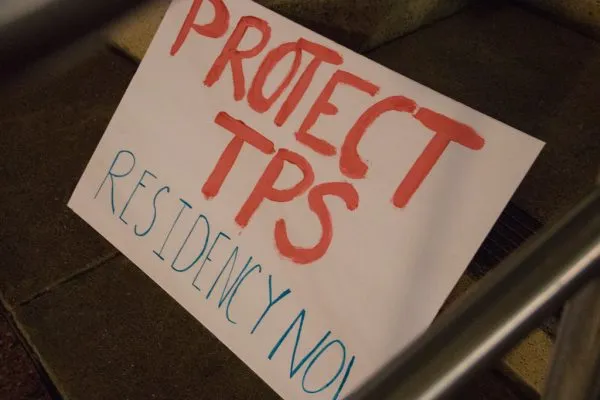Every time a Haitian TPS holder pays their $545 Haitian TPS fees, they are reminded of the high cost of Temporary Protected Status. For many, this is a difficult pill to swallow, as they can barely make ends meet as it is.
But despite the expense, TPS holders continue to renew their status every time because they know that losing their protections would be far worse. This fee forces many Haitians into an impossible situation, but it’s one that they are willing to face to maintain their status in the United States.
What is Temporary Protected Status?
Temporary Protected Status (TPS) is a designation given by the United States government to foreign nationals who are in the country but cannot return to their home country due to conditions that make it unsafe. TPS is granted temporarily and can be renewed. TPS holders are eligible for work authorization and can apply for a travel document.
Haitians were granted TPS following the 2010 earthquake, which devastated the country. TPS is a temporary immigration status that can be renewed periodically.

Haiti is one of the most impoverished countries in the world and has been struggling with a high rate of human rights abuses for years. As a result, many Haitian nationals have fled the country for a better life. Unfortunately, many of these people have ended up in the U.S. seeking Temporary Protected Status (TPS) from the citizenship and immigration services.
How Many Haitians are in the U.S. Seeking TPS?
More than one hundred thousand Haitians who were already living in the United States before July 29, 2021, were eligible to apply for tps by President Joe Biden to petition for tps designation, which permits them to continue living and working in the United States temporarily.
Even though their nation is still reeling from the assassination of President Jovenel Moise and the one-two punch of a 7.2-magnitude earthquake and a tropical storm last summer, he has largely pursued a strategy of deterrence and exclusion for Haitian migrants outside of U.S. borders.
Why Did the U.S. Grant TPS to Haiti?
The United States granted TPS to Haiti in 2010 in response to the devastating earthquake that struck the country. TPS allows Haitian citizens who were already in the United States at the time of the earthquake to remain in the country temporarily. The United States has recently renewed TPS for Haiti, most recently in 2021.

What Are the Conditions for Haitian TPS?
There are a few conditions that must be met to qualify for TPS:
- The applicant must have been physically present in the United States when the TPS designation was made for their country.
- The applicant must have resided in the United States since the TPS designation date.
- The applicant must not have been convicted of any felony or two or more misdemeanors while in the United States.
The application must be of a nationality who last habitually resided in Haiti.
What is the Expansive Scope of TPS?
Any foreign national who has been granted lawful status can remain in the U.S. and is protected from removal. They are also eligible to apply for an Employment Authorization Document (EAD), which allows them to work in the United States.
In addition, TPS holders are not considered to be unlawfully present in the United States, which means they are not subject to the three- and ten-year bars on reentry that apply to other foreign nationals who have been removed from the country.
The Expansive Scope of TPS currently applies to the citizen of Haiti, El Salvador, Honduras, Nepal, Nicaragua, Somalia, Syria, and Yemen. An individual must have been a citizen of one of these countries to be eligible.
At the time of the relevant application for temporary protected status, they must have continuously resided in the United States since the designated date, and they must have been physically present in the United States on the designated date and at the time of application for TPS status.
The status is granted for a specific period, and people with tps can renew it. However, it is important to note that is designated for one does not lead to lawful permanent residence or citizenship.
Does it cost money to apply for TPS?
If you are a national of Haiti currently residing in the United States, you may be designated for tps by filing. TPS is a form of relief that allows individuals from certain countries to live and work in the U.S. for a limited period.
To apply for eligibility for tps, you must first file Form I-821 ($135) with the united states citizenship and immigration services(USCIS).
Once your application has been approved, you must file Form I-765 and pay application fees and/or the biometrics fee to receive your Employment Authorization Document (EAD).
Finally, you will need to submit Form G-1145 to USCIS to receive email or text updates about your case. Please note that it can take several months to complete the application process, so be sure to start the process as soon as possible. You should expect to repeat this process each time your TPS expires.
Those between the ages of 14 and 65 have to pay the filing fee unless they request a waiver of tps-related and get approval.
$135 for the designation of temporary protected status Form I-821
Form I-765 (optional application for employment authorization) – $410.00
If you need a work permit, the total cost is $545.
Can you use a notary for your application?
Registering for TPS can be complex and time-consuming, so it’s important to ensure you have all the required documents and information before beginning. One common question is whether or not you can use a notary to help with your application.
You can use a notary to witness the signing of your application form, as well as any other supporting documents. However, it’s important to note that a notary cannot provide legal advice or assistance in completing the application. If you need legal services for TPS, it’s best to consult an experienced immigration lawyer who can help ensure your application is complete and correct.
If I file for a waiver of tps-related application fees, will USCIS deny my application?
There is no guarantee that USCIS will deny your application submitting a fee waiver request. However, USCIS may deny your initial registration application if it finds that you cannot pay the required fees.
Do all Haitian tps applicants get tps and work Authorization?
Haitians currently in the United States may be eligible for Temporary Protected Status (TPS) if they meet certain criteria. TPS is available to individuals from a designated country who meet specific requirements, such as those without nationality who last habitually reside in the United States.

To be eligible for TPS, Haitians must also have been physically present in the United States on the date that TPS was designated for their country of origin. Additionally, they must have continuously resided in the United States since that date and must be admissible to the United States as an immigrant. If you believe you may be eligible for TPS, you should contact an experienced immigration attorney for assistance with your case.
Deferred Enforced Departure DED for Haitians
In addition to Temporary Protected Status (TPS), there is also a sort of blanket respite from removal that is referred to as deferred enforced departure (DED), which was once known as extended, voluntary departure (EVD). A DED is a discretionary, temporary, administrative stay of removal that can be given to foreign nationals from certain countries.
In contrast to a TPS designation, a DED designation arises from the President’s constitutional authority to conduct foreign affairs and is not supported by any statute. Since its inception in 1990, DED has been implemented in seven nations (for more information, see “Historical Use of Blanket Relief”). The Department of Economic Development (DED) is currently responsible for Liberia, Venezuela, and Hong Kong.
eligibility requirements for tps Work Authorization
The applicant must be a citizen of one of the qualifying countries, have been present in the United States since the effective date of TPS for their country, and have been continuously physically present in the United States since that date to be eligible for employment authorization and TPS.
The applicant must also meet all other TPS eligibility requirements. If an applicant is eligible for TPS, they will be issued an Authorization Document (EAD). This document will allow them to legally work in the United States for the duration of their TPS status.
There are a few exceptions to this general rule. For example, applicants who are already employed in the United States or have been granted asylum may not need an application for work authorization to continue working.
Also, people employed by the federal government or who have a pending application for permanent residence through another immigrant category may not need an EAD. Check with your local USCIS office to see if you need an EAD to work while your TPS application is pending. If your TPS application is approved, you will receive a notice from USCIS with information on obtaining your EAD.
Can current Haitian tps holders use TPS to obtain permanent resident status?
There is no guarantee that legal status will be granted to a TPS recipient, but applying for lawful permanent resident status is possible if TPS is approved. If you are granted TPS, you will be given a legal status that allows you to live and work in the United States for a specific period. Once TPS expires, you will need to re-register for TPS if you want to stay in the United States.
However, if you have been granted TPS, you may be eligible to apply for a green card. To do this, you must meet certain immigration requirements, including being physically present in the United States for a certain time and maintaining a continuous eligible status. You can use TPS to obtain permanent resident status if you meet these requirements.
To obtain a Green Card, you must have been admitted to the United States at an airport or other port of entry with a valid travel document and be otherwise qualified for a Green Card through a family or employment petition or seeking asylum.
However, if you entered the United States without being inspected, such as at the border, you will not be able to modify your immigration status.
This is because you need admission to change your status in the United States.
TPS is not an admissions process in the United States.
A Green Card application must be submitted from a country other than the United States.
Benefits of TPS for Haitians
TPS is an important program that provides temporary protection and relief for Haitians who cannot return to their country safely. TPS holders can live and work in the United States and access essential services like healthcare and education. TPS also allows Haitians to send money back to their families in Haiti, which can help support economic development and stability in the country.



